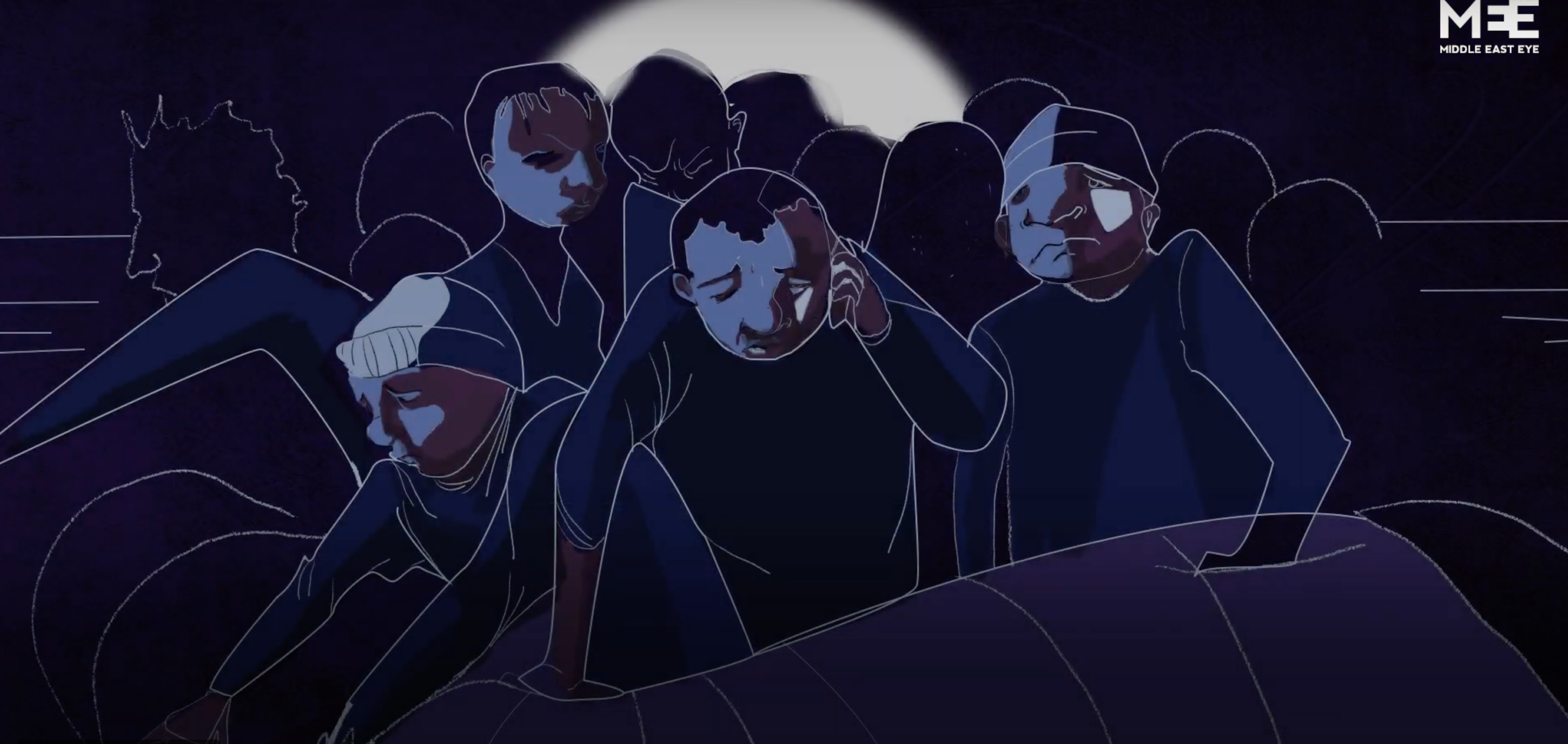 Image taken from the video “You’ll die at Sea: the tragic story of a migrant poet” by Middle East Eye/Maria Pullicino
Image taken from the video “You’ll die at Sea: the tragic story of a migrant poet” by Middle East Eye/Maria Pullicino
A year ago, between 16 and 17 August 2020, a terrible shipwreck took place off Libya. 82 people on a white rubber boat called Alarm Phone when they were in distress at sea, and we alerted all authorities but nothing was done to support them (see our statement). After we lost contact with the people in distress, they encountered a group of armed men, who shot at the boat to rob the people of their belongings. The boat caught fire and forty-five people were killed. Those who survived are alive only because a local fisherman rescued them, as the survivors reported in a video testimony shared with Alarm Phone last year.
Identifying shipwreck victims is difficult and rare. It is almost impossible unless families or friends of the missing get in touch to report their presence on a particular boat and their absence amongst survivors. Too many deaths are invisibilised and silenced – people die in anonymity. Their loved ones might never know their fate, or wait in vain for their return for years. Fortunately, in the case of 17 August 2020, some survived and could reconstruct the events as well as the identity of the friends they lost.
Among the people who died that day was a poet from Darfur, Abdal Wahab Latinos, who had written painful words about the condition of migrants in Libya as well as about death at sea, predicting his own tragic death at sea. His life and death were also narrated in a video produced by Middle East Eye.
As Ahmed, one of the survivors, recollected:
بتذكر اخر دقائق قبل وفاته كان راكب قدام مطاط واقف وتعب جلس ومعاه انبوبة سيارة كسترة من الغرق لكنه لم يتمكن من انقاذ حاله وفي تلك اللحظة كل واحد يقول يا ليتى نفسي
وكان لا يعرف السباحة اطلاقآ
مجرد وقوعه في الماء لم نستطيع رؤيته مرة اخرى
وهكذا قد فارق الحياة
له الرحمة والمغفرة صديقي العزيز سنلتقي في الجنة باذن الله
Remembering the last minutes before he died, he was a passenger in front of a rubber boat, tired, sitting and using a car tube as a lifejacket to prevent him from drowning. But it couldn’t save his life, and at that moment, everyone says I wish I had it myself.
He never knew how to swim.
He just fell in the water and we couldn’t see him again.
And just like that he died.
May Allah have mercy and forgiveness, my dear friend, we will meet in heaven, God willing.
The words written by Latinos clearly represent the experience of many who are stranded in Libya, the real possibility of death at sea, the visible and invisible violence of European borders that steal people’s lives or, if not their lives, those of their loved ones. Borders that also steal their time and their freedom. But, as the words below show, they will never be able to steal their powerful voices, even after death.
Dying at Sea
To die at sea where, waves crash loudly in your head,
Water swings your body, like a punctured boat.
Or to die in a wasteland, where fresh cold tears tear through your body with pain.
To die alone hugging the faded color shadow of yourself,
Tomorrow it becomes like a shapeless ghost, that nobody knows;
That will never make a difference.
Poem by Abdal Wahab Latinos,
Translated by Salih Abolgasim
Many of those who survived this shipwreck tried again to escape Libya by crossing the Mediterranean Sea to reach safety in Europe. Some of them made it. Others did not make it – they were pushed back several times by the so-called Libyan coastguard, they almost lost their lives again in other shipwrecks or back on land, in a violent and lethal circle of imprisonment, exploitation, further trauma and more dangerous journeys.
As a survivor writes, who currently is still stranded in Libya:
In the name of God, the Most Gracious, the Most Merciful
A brief history of the memory of August 17, 2020 the worst thing that happened that year, an eternal and historical struggle for me and my brothers. Mercy and forgiveness for the martyrs Heroes and for the wise poet Abdel Wahhab Latinos.
A special thanks for those who stood by us in these times. Especially the Alarm Phone, as they were playing a key role in supporting people on the move. I wish them verbal, moral and material strength.
I would like to leave this message since I’m one of those who are invested in this issue and will be until my last day. I will not forget it. I believe in a saying, a beautiful memory erases a sad memory, and time will always mend. I believe that every struggle we go through, is nothing but preparing us for tomorrow. You need to be stronger, and I believe after every disappointment there’s great joy.
I also want to say something brief about migration. We know very well and you know what the reasons for migration are. I just wanted to say our slogan.
In order to get there, we ride the boats of the impossible. If there are hundreds of thousands who want to emigrate, let them cross because we are overwhelmed with the difficult conditions in Africa.
May the peace, mercy and blessings of God Almighty be upon you.
To keep these voices alive, together with survivors, Latinos’s friends and friends who survived these dangerous journeys, we decided to translate Latinos’ poems from Arabic into English. If you want to support the project please get in touch on: media@alarmphone.org
—
Latinos’ Blog
https://abdalwahablatinos.blogspot.com/
Middle East Eye Video:
https://www.middleeasteye.net/video/youll-die-sea-tragic-story-migrant-poet
Alarm Phone report and survivors’ testimonies:
https://alarmphone.org/en/2020/08/23/four-shipwrecks-in-one-week-off-libya/